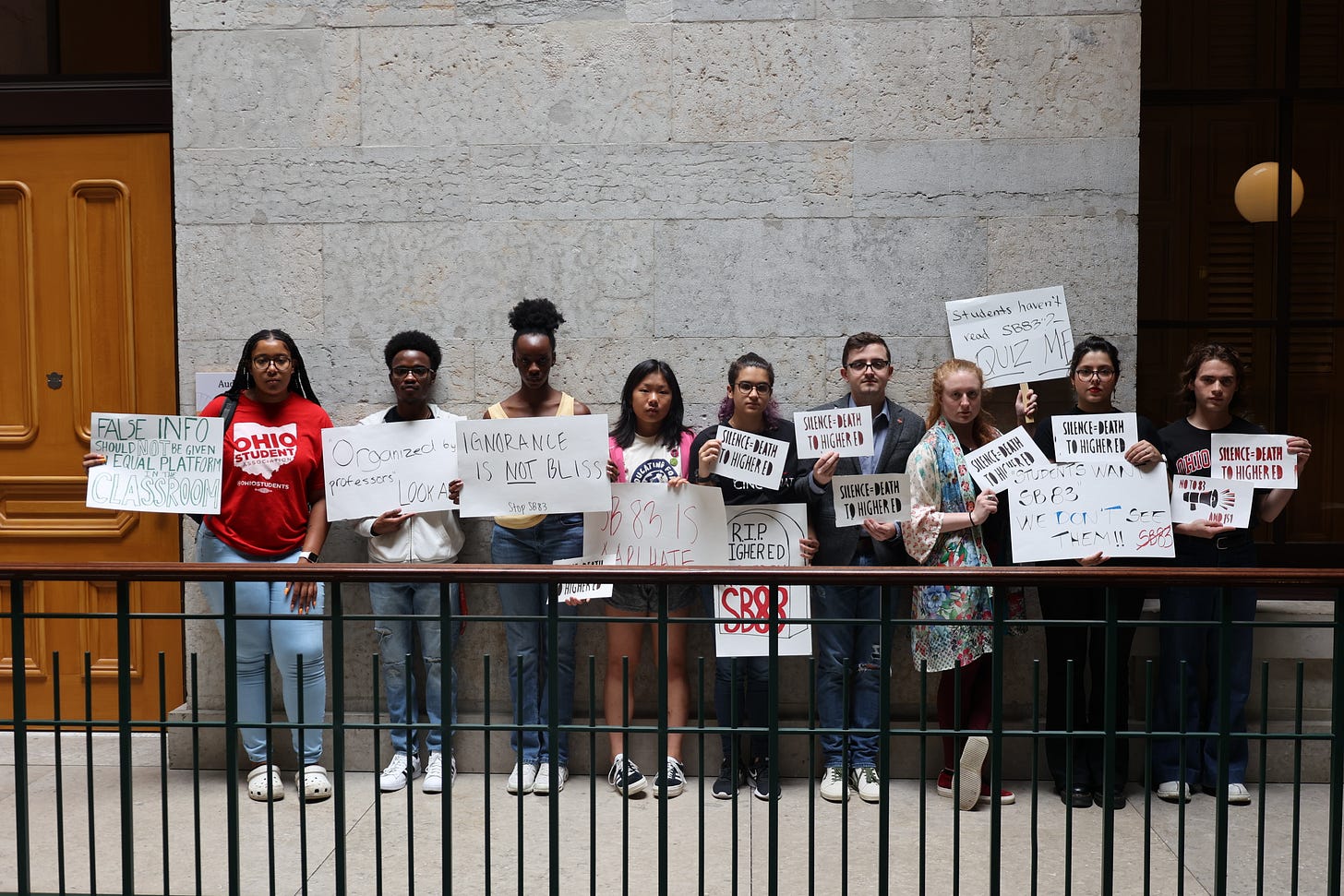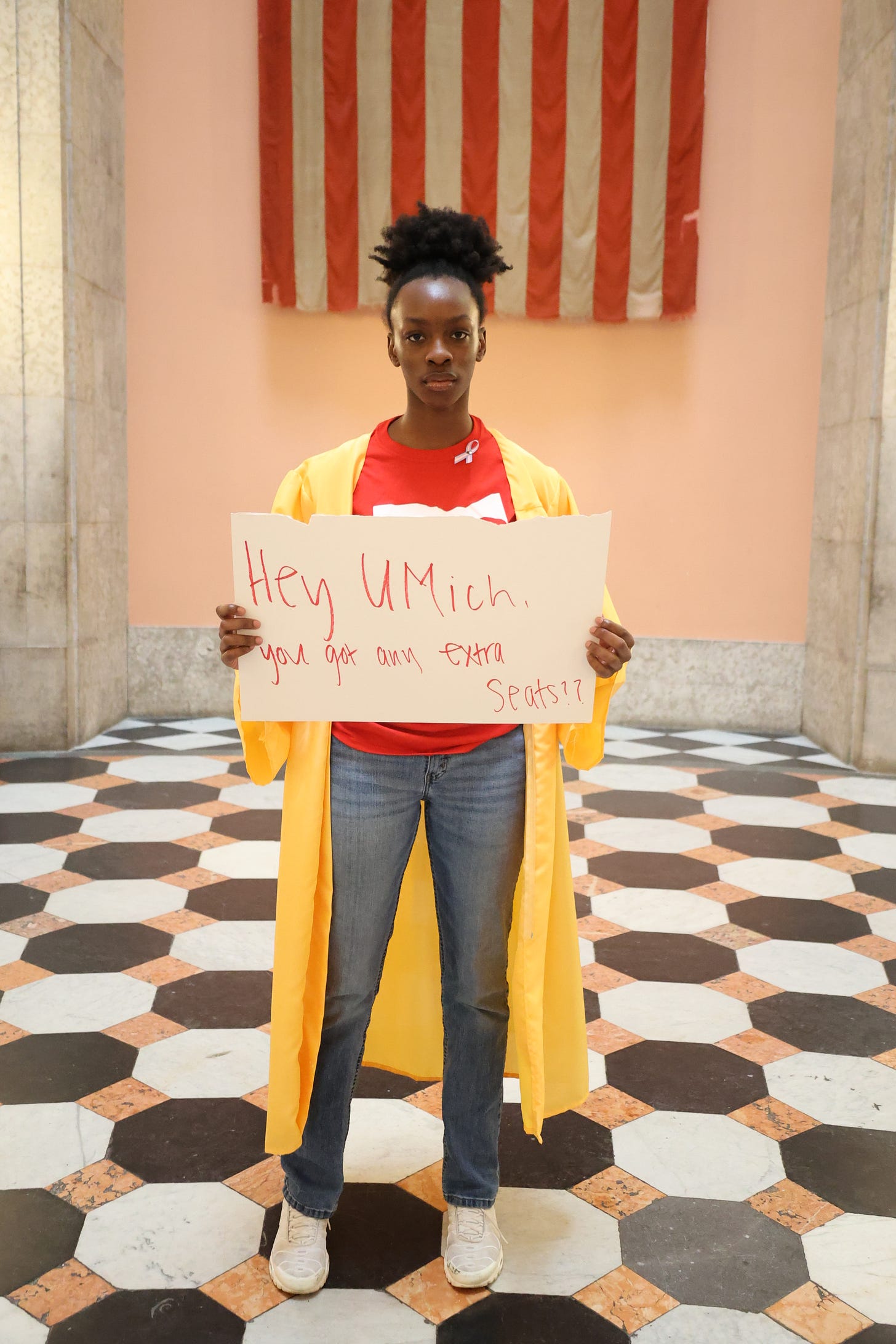Ohio students hold 'mock funeral' for higher education as state lawmakers move to pass education bill
Resembling Florida and Texas, students at universities in Ohio push back against the state's attempt to control what's taught in public classrooms.
This week, students from more than 10 universities in Ohio held what they are calling a “mock funeral” to commemorate the “death of higher education” at the Ohio state House. Donning graduation gowns and electric candles, they also held a march around the state Capitol. The student-led demonstration was in response to a state Senate bill (SB 83) titled the “Ohio Higher Education Enhancement Act” that has been looped into a Senate approved budget.
According to The Ohio Capital Journal, the bill “would ban university staff and employees from striking, college students would be forced to take certain American history courses, professor tenure would be based around ‘bias,' and mandatory diversity, equity and inclusion training would be prohibited, with only specific exemptions.”
Proponents of the bill say it would mitigate “bias” on college campuses, while opponents argue that the language is too vague and are nervous about which “controversial” topics could be restricted. The bill resembles initiatives like a Florida law signed earlier this year that bans DEI initiatives at public schools.

In a press release, the Ohio Student Association (OSA), which has student-led chapters on college campuses across the state, wrote:
“OSA understands that REAL ‘intellectual diversity’ leans strongly on our academic freedom and freedom of thought, in other words making it so that everyday Ohioans from different walks of life– whether Black, white, or brown– we have the opportunity to succeed, thrive, and give back to our communities.”
Some college students involved are threatening to leave the state over the proposed legislation.

Josie Mayle, a 19-year-old student at Cleveland State University, told The Up and Up that she thinks the language in the bill is “a very slippery slope.”
“It could just spiral very quickly into things we are seeing in other states like Florida and Texas with book banning and cracking down on what teachers can say in their classrooms,” Mayle said.
Asked about the mock funeral organized by student protestors, Mayle said:
“Our main goal with doing that was to symbolize the death of higher education if SB 83 is to become law because that is essentially what it would do. It would really detrimentally affect higher education in the state.”
For their part, Clovis Westlund, a 20-year-old student studying public affairs and sociology at Ohio State University, said that taking an intro to sociology course on a whim opened up a whole new world for them that may be unavailable to future students if the bill becomes law.
“The course content was giving me the words to understand my experiences and write about my experiences in a way that could account for more than how I have lived,” Westlund told The Up and Up. “To have that experience of being in a course where I felt so empowered because of the material I was taught and the way I was able to apply it to my own experience, I want to continue that kind of learning and thinking through that questioning.”
Despite protesting against the proposed changes to higher education since the bill was first introduced (including testifying during finals season), students feel their voices are not being heard.
“Legislators are supposed to listen to constituents, but they’re ignoring student and faculty voice,” Westlund said.
“The reason we were holding a funeral, which is not the most hopeful thing in the world, it’s because students across Ohio have been showing up time in and time out around SB 83,” Westlund said. “As this bill has moved and changed over the past two months, students have kept showing up, and we will keep showing up.”
Youth vote in the news 🗞
One big story making headlines this week is the young people in Montana who are suing the state over what they say is its role perpetuating the climate crisis. Sixteen young plaintiffs ages 5-22 are taking part.
A landmark youth climate trial begins in Montana, Mike Baker for The New York Times.
Young climate activists take Montana to court for its role in global warming, Amy Beth Hanson and Matthew Brown for The Associated Press
According to CNN’s Ella Nielson, “The crux of their legal argument is Montana’s continued development of its coal reserves and other fossil fuels break the state’s constitution, which since 1972 has guaranteed the right to ‘a clean and healthful environment.’ Montana is one of the few states with such an explicit reference to a clean environment enshrined in its state constitution.”

